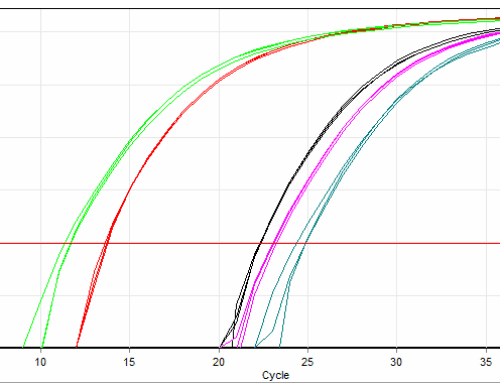
Tumor Gene Profiling by qPCR in Canines
qPCR (quantitative real-time PCR) is a widely used technique for analyzing gene expression in canine tumors. It serves as a powerful tool for validating gene expression changes identified by other methods, such as microarrays or RNA sequencing, and for profiling specific genes of interest related to cancer biology.
Applications and Findings
- Cancer-Associated Stroma (CAS) Markers:
RT-qPCR has been used to analyze gene expression signatures in the tumor stroma of canine mammary carcinomas. Key genes found upregulated in the tumor stroma include COL1A1 (Collagen1α1), ACTA2 (αSMA), FAP, PDGFRβ, and Caveolin-1, while CXCL12 was significantly downregulated. These changes mirror many aspects of human cancer stroma, supporting the use of dogs as a model for human cancer research[1]. - Osteosarcoma Prognostic Markers:
In canine osteosarcoma, qPCR has validated the overexpression of genes such as ANKRD17, MGST1, MRPS31, and NCOR1 in tumors from dogs with poor survival outcomes. These genes are linked to processes like cell cycle regulation, drug resistance, and metastasis-hallmarks of aggressive cancer phenotypes[2]. - Global Gene Expression Profiling:
qPCR is often used to validate findings from global gene expression studies. For example, in canine mammary carcinomas, qPCR confirmed the upregulation of the HYAL-1 gene, among hundreds of other differentially expressed genes identified by broader screening methods[3]. - Reference Gene Selection:
Accurate qPCR requires stable reference genes for normalization. Studies have identified suitable reference genes for canine mammary tumors, such as those validated using the GeNorm algorithm[4]. - High-Throughput Gene Panels:
High-throughput qPCR platforms allow for the simultaneous analysis of dozens of cancer-associated genes, enabling comprehensive gene expression profiling in canine tumors[5]. Here at ARQ Genetics, we have developed several panels for the express use of characterizing tumors in canine companions, leading to successful treatment.
Pathways and Biological Processes
qPCR-based gene expression studies in canine tumors have highlighted the involvement of key cancer-related pathways, including:
- Wnt signaling
- Chemokine/cytokine signaling
- Integrin signaling
- Ubiquitin-proteasome pathway
- Apoptosis and cell cycle regulation[2]
These pathways are commonly deregulated in both canine and human cancers, further emphasizing the translational value of canine tumor models.
Summary:
qPCR is a central method for tumor gene expression analysis in canines. It is used to validate and quantify the expression of cancer-related genes, identify prognostic markers, and explore the molecular underpinnings of tumor biology, with findings often paralleling those in human oncology[1][2][3].





